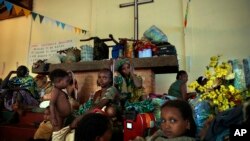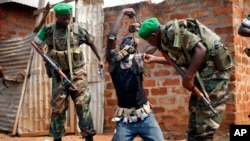Amnesty International reports escalating violence in the northwestern region of Central African Republic as anti-Balaka Christian militias continue looting and killing the elderly, women and children in Muslim communities.
Senior crisis adviser Donatella Rovera of Amnesty International tells VOA that the Central African Republic continues to deteriorate as civilians seek refuge from on-going violence.
Rovera says new evidence underscores the extreme dangers faced by Muslim women, children and the elderly who are being slaughtered by Christian anti-Balaka militias.
In the center of a sectarian conflict
“The situation is extremely tense here in Bouar and in the nearby town of Baoro and other places where the international peacekeeping forces are not present,” Rovera reports today by telephone from Bouar, which is in the center of the sectarian conflict in the west of the country.
“Yesterday, as we were driving to Baoro we met a large group of anti-Balaka Christian militias who told us that they were on their way to attack the town of Baoro.
“There were more of these militia members on the way out of Baoro. We know that they have already received more members from other parts of the governate, and more are coming this way.”
Anti-Balaka militias – balaka is a local term for machete – formed to oppose predominantly Muslim Seleka forces. Seleka rebels under the command of Michel Djodotia over-threw the regime of President Francoise Bozize last year. The Seleka forces refused Djotodia’s orders to disarm and the violence began. Djotodia recently resigned and a transitional president, Mrs.Catherine Samba-Panza, was named last week.
There are now an estimated 1,500 French peacekeepers in the former French colony and more than 5,000 African Union peacekeepers from countries in the region.
Peacekeepers offer no protection in remote areas
Amnesty declares that peace-keeping forces are not going into the most dangerous areas to protect civilians, leaving them vulnerable to attacks.
Rovera said the people of the Bouar have absolutely no protection from the attacks because the international peace-keeping forces are not present in these remote towns in the northwest.
“The French troops do not get this far north,” she says. “They go elsewhere.
“The African Union peace-keeping forces are in this area, but they just mainly patrol the main roads and do not go into some of the towns where their presence is sorely needed, and where it would make a huge difference,” says Rovera. “Where it could really save lives.”
The Amnesty International senior crisis adviser says given the number of peacekeepers on the ground, they should be going into the areas where protection is needed the most. However, she says they are largely staying in the main parts of the nation.
“We see large convoys with hundreds of troops going up and down the road. We found them in the market buying snacks, but they don’t go enough into the town.
“Basically, they need to get out of their barracks more,” she says. “They need to get off the main roads more and into the town.
"And they need to stay where civilians are in imminent threat,” exclaims Rovera.
Senior crisis adviser Donatella Rovera of Amnesty International tells VOA that the Central African Republic continues to deteriorate as civilians seek refuge from on-going violence.
Rovera says new evidence underscores the extreme dangers faced by Muslim women, children and the elderly who are being slaughtered by Christian anti-Balaka militias.
In the center of a sectarian conflict
“The situation is extremely tense here in Bouar and in the nearby town of Baoro and other places where the international peacekeeping forces are not present,” Rovera reports today by telephone from Bouar, which is in the center of the sectarian conflict in the west of the country.
“Yesterday, as we were driving to Baoro we met a large group of anti-Balaka Christian militias who told us that they were on their way to attack the town of Baoro.
“There were more of these militia members on the way out of Baoro. We know that they have already received more members from other parts of the governate, and more are coming this way.”
Anti-Balaka militias – balaka is a local term for machete – formed to oppose predominantly Muslim Seleka forces. Seleka rebels under the command of Michel Djodotia over-threw the regime of President Francoise Bozize last year. The Seleka forces refused Djotodia’s orders to disarm and the violence began. Djotodia recently resigned and a transitional president, Mrs.Catherine Samba-Panza, was named last week.
There are now an estimated 1,500 French peacekeepers in the former French colony and more than 5,000 African Union peacekeepers from countries in the region.
Peacekeepers offer no protection in remote areas
Amnesty declares that peace-keeping forces are not going into the most dangerous areas to protect civilians, leaving them vulnerable to attacks.
Rovera said the people of the Bouar have absolutely no protection from the attacks because the international peace-keeping forces are not present in these remote towns in the northwest.
“The French troops do not get this far north,” she says. “They go elsewhere.
“The African Union peace-keeping forces are in this area, but they just mainly patrol the main roads and do not go into some of the towns where their presence is sorely needed, and where it would make a huge difference,” says Rovera. “Where it could really save lives.”
The Amnesty International senior crisis adviser says given the number of peacekeepers on the ground, they should be going into the areas where protection is needed the most. However, she says they are largely staying in the main parts of the nation.
“We see large convoys with hundreds of troops going up and down the road. We found them in the market buying snacks, but they don’t go enough into the town.
“Basically, they need to get out of their barracks more,” she says. “They need to get off the main roads more and into the town.
"And they need to stay where civilians are in imminent threat,” exclaims Rovera.






